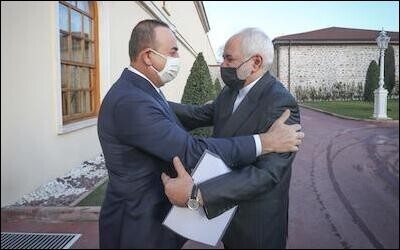Turkish Foreign Minister Mevlut Cavusoglu (left) welcomes his Iranian counterpart in Istanbul on January 29. (AFP) |
In a sign of its increasing desire to work closely with Tehran against US interests in the Middle East, Turkey hosted Iran’s Foreign Minister Javad Zarif in Ankara on Friday.
The meeting illustrated that Turkey’s recent push for Azerbaijan to fight Armenians in the Caucasus will likely end with Ankara, Moscow and Tehran cooperating in that region to carve it up into spheres of influence, like in Syria and Libya.
Fueled by the Trump administration’s having worked closely with Turkish President Recep Tayyip Erdogan, Ankara has pivoted in the last several years to engage with Russia and Iran.
This appears counterintuitive, because Washington wanted to work with Turkey and even gave it a greater role in Syria. But Ankara’s goal was to use the blank check it had from the Trump administration to move away from NATO into the orbit of Moscow and Tehran, in order to partition areas of the Middle East and remove the US and the EU.
Turkey has a well-oiled pro-government media machine and lobby that works to tell one story to Iran hawks in Washington and another to regional media. For instance, Turkey has been pushing a media narrative that it wants reconciliation with Israel and could sideline Hamas, which has a red carpet in Ankara. In reality, however, Turkey and Iran both back Hamas, and Zarif’s visit to Ankara was symbolic of the Turkey-Iran alliance.
Turkish and Iranian media, which are all pro-government, heralded the new era of Turkey-Iran ties. Ankara has pushed for Washington to return to the Iran Deal. Turkey told the Trump administration that it was a bulwark against Iran and Russia, but secretly it always supported the Iran Deal and opposed the Trump administration’s tough talk on Tehran. But in order to receive key support from the US State Department and men like US Syria envoy James Jeffrey, Turkey was willing to pretend it cared about confronting Iran.
Zarif said in Ankara on Friday that both Iran and Turkey have a common stance that stability will be restored to the region only through “synergy.”
“Zarif made the remarks in a post on his official Twitter account on Friday at the end of his visit to Turkey, where he held ‘constructive, friendly and fruitful’ talks with Erdogan and Foreign Minister Mevlut Cavusoglu, Press TV in Iran noted.
Turkey and Russia are also opening a coordination center in Karabakh, the Armenian area that Turkey prodded Azerbaijan to retake in September. This illustrates that Russia and Turkey will now work closely in Idlib in Syria, in Libya, and in Azerbaijan. While the US and Italy appear to be slowing down arms sales to Saudi Arabia, Turkey has bought Russia’s S-400 air defense system and is moving closer to Moscow and Tehran in key deals. Turkish media also praised the “Iron Silk Road,” a new rail line to Baku and then Russia that will carry goods. Turkey is also shipping goods via rail to China, Anadolu reports:
“Although trains had traveled this route to China before, this is the first time that exports are being hauled from Turkey to Russia via rail, Turkish Transportation and Infrastructure Minister Adil Karaismailoglu stressed during an event at the train station... Karaismailoglu underlined the importance for Turkey of China’s Belt and Road initiative, which aims to create a network of transportation infrastructure between China, Asia, Europe and the Middle East.”
Talks with Zarif and reports about rail links illustrate that a much larger alliance system is rising. It is based on Turkey, Russia, China and Iran working together. Turkey and Russia have partitioned Libya, Syria and the Caucasus. Iran and Turkey will begin to work more in concert on many files.
The US has opposed foreign interference in Libya, where Russia and Turkey are accused of violating an arms embargo. US National Security Advisor Jake Sullivan spoke by phone on Thursday with European Commission President Ursula von der Leyen’s head of cabinet, Bjoern Seibert. While they discussed the transatlantic alliance between the US and Europe, they also “agreed to work together on issues of mutual concern, including China and Turkey.”
This shows that some in the US administration understand that Turkey is part of a Chinese-Russian network of authoritarian states. However, the new US administration also wants to engage more with Iran.
Seth J. Frantzman is a Ginsburg-Milstein Writing Fellow at the Middle East Forum and senior Middle East correspondent at The Jerusalem Post.







